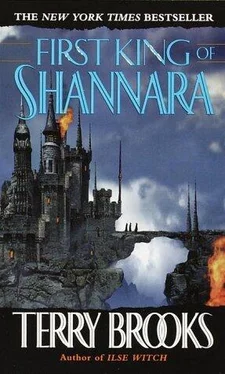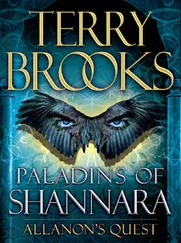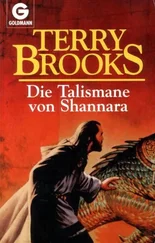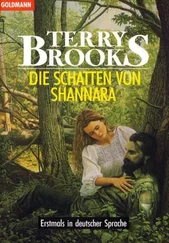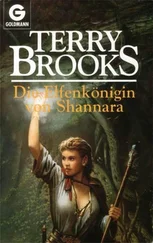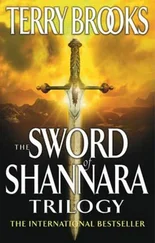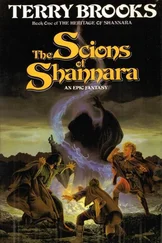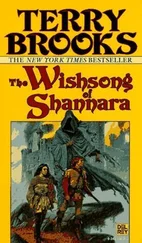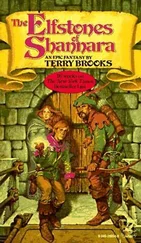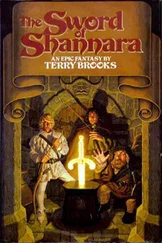After dinner was completed and the Stors had drifted back to whatever work commanded their attention, the Borderman sat with the girl on a hard-backed bench on the dining-hall porch and looked out at the gathering gloom. His thoughts were distracting to him. Bremen had not appeared. Perhaps he was still at Paranor.
Perhaps he was trapped on the other side of the Rabb, with the Northland army settled between them. Kinson did not like the uncertainty of it. He did not like being forced to await the Druid’s arrival, kept idle when he would rather be active. He could wait when it was necessary, but he questioned the reason for waiting now. It seemed to him that Bremen should have sent him on ahead to look for Cogline, even if it meant going into Darklin Reach. It felt to him as if time was slipping away from them all.
A line of Stors appeared from the hall, cloaked and hooded, withdrawn and secretive. They went down the porch steps and across the roadway to another building, their white forms slowly fading into the gray haze of twilight, ghosts in the night. Kinson wondered at their single-mindedness, at the peculiar mix of dedication to work and obliviousness to the world beyond their tiny village. He glanced at Mareth, trying to picture her as one of them, wondering if she still wished she had been accepted into their order. Would the isolation better agree with her, beset by the dictates of her magic’s use, by the threat of its escape? Would she feel less constrained here than at Paranor? The puzzle of her life intrigued him, and he found himself thinking of her in ways he had never thought of anyone else.
He slept poorly that night, plagued by dreams rife with faceless, threatening creatures. When he came awake shortly before dawn, he was on his feet and had his sword in hand almost before he realized what he was doing. There were voices without, harsh and guttural, and he could hear the ring and scrape of armor. He knew at once what had happened. Leaving his boots behind, taking only his sword, he eased from his bedroom and slipped down the hallway to the front entry where a bank of windows opened onto the main street. Keeping to the shadows, he peered out.
A large Troll raiding party had appeared in the roadway and was facing a small cluster of Stors who stood on the steps of the main healing center across the way. The Trolls were armed and threatening; their gestures made it clear that they intended to go inside. The Stors were not opposing them in an overt manner, but neither were they giving way. The angry voices belonged to the Trolls; the Stors were silent and stoic in the face of the intruders’ threats. Kinson could not tell what the Trolls wanted—whether it was food and supplies or something more. But he could tell that the Trolls were not going to give up on their demands. They understood as clearly as he did that there was no one in the village to oppose them.
Kinson stared from darkened building to shadowed walkway, from heavy forest to open road, and considered his options. He could stay where he was and hope that nothing happened. If he did that, he was condemning the Stors to whatever fate the Trolls decided upon. He could attack the Trolls from the rear and probably kill as many as four or five before the rest overpowered him. Not much would be accomplished with that. Once he was killed, as he surely would be, the Trolls would be free to do as they chose with the Stors anyway. He could try a diversion. But there was nothing to guarantee that he would draw all of the Trolls away from the village or that they would not return later.
He thought suddenly of Mareth. She had the power to save these people. Her magic was powerful enough to incinerate the entire Troll raiding party before even one could blink. But Mareth was forbidden to use her magic, and without her magic she was as vulnerable as the Stors.
Across the way, one of the Trolls had begun to climb the steps onto the porch, his huge pike lowered menacingly. The Stors waited for him, white-robed sheep in the path of a wolf. Kinson gripped his sword tighter and moved to the front door, easing it carefully open. Whatever he was going to do, he was going to have to do it quickly.
He was ready to step out from the shadows of the doorway when a shriek arose from the midst of the beleaguered Stors.
Someone pushed through them from out of the building they warded, a shambling, half-clothed figure that tottered and nailed as if beset by a form of madness. Rags trailed from the figure, the bindings for wounds that now lay open and weeping. The creature’s face was ravaged by sores and lesions, the body made frail by a wasting disease that had left the bones taut against the mottled and withered skin.
The figure stumbled from the midst of the Stors to the edge of the porch, wailing in despair. The Trolls brought up their weapons guardedly, the foremost falling back a step in shock.
“Plague!” the ravaged creature howled, the word rising up in the silence, harsh and terrible. A swarm of insects rose off the creature’s back, buzzing madly. “Plague, plague everywhere! Flee! Flee!”
The creature swayed and dropped to its knees. Bits of flesh fell from it, and blood dripped from its open wounds onto me wooden steps, steaming in the cool night air. Kinson winced in horror. The disease was causing it quite literally to fall apart!
It was all too much for the Trolls. Soldiers to the core, they were brave in the face of enemies they could see, but as terrified of the invisible as the meekest shopkeeper. They fell back in disarray, trying not to show fear, but determined not to stay another moment in close proximity to the disaster that had collapsed on the steps before them. Their leader waved off the Stors and their village in a gesture of anxious defiance, and the entire patrol hurried back down the roadway in the direction of the Rabb and disappeared into the trees.
When they were gone, Kinson stepped into the light, sword lowering as the pulse of his body slowed and the heat of his blood cooled. He looked back at the Stors across the way, finding them clustered about the strange apparition, heedless of the disease that ravaged it. Forcing himself to ignore his own fear, he crossed to see if he could be of help.
On reaching them, he found Mareth standing in their midst.
“I broke my promise,” she said, her large dark eyes anxious, her smooth face troubled. “I’m sorry, but I could not stand by and see them harmed.”
“You used your magic,” he guessed, amazed.
“Just a little. Just that part that goes into the healing, the part I use as an empath. I can reverse it to make what is well appear sick.”
“Appear?”
“Well, mostly.” She hesitated. He could see the weariness now, the dark circles about her eyes, the lines of fading pain etched at the comers of her mouth. Sweat beaded her forehead. Her fingers were crooked and rigid. “You understand, Kinson. It was necessary.”
“And dangerous,” he added.
Her eyelids fluttered. She was on the verge of a real collapse. “I am all right now. I just need to sleep. Can you help me walk?”
He shook his head in dismay, picked her up without a word, and carried her back to her room.
The following day, the Northland army decamped and moved south. One day later, Bremen appeared. Mareth had recovered from the effects of her magic and looked strong and well again, but Bremen appeared to have taken her place. He was haggard and worn, dust-covered and spattered with mud, and clearly angered.
He ate, bathed, dressed in fresh clothing, and then told them what had kept him. After making certain that the magic that warded the Druid’s Keep was returned to its safehold and that the Keep was intact, he had gone once more to the Hadeshorn to speak with the spirits of the dead. He was hoping that he might learn more of the visions he had been shown on his last visit, that something further might be revealed to him. But the spirits would not speak, would not even appear, and the waters of the lake rose up in such fury at his summons that they threatened to inundate him, to drag him down into their depths for the audacity of his intrusion. His voice took on an edge as he described his treatment. He had been given all the help he was going to get, it appeared. Their fate, from here forward, was largely in their own hands.
Читать дальше
